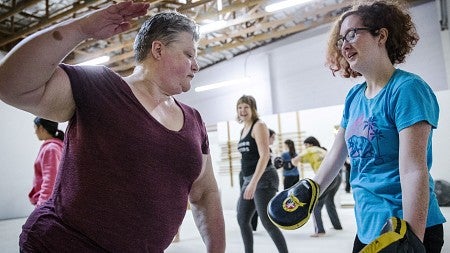Rhodes Scholarship in Hand, Her Sights Are Set on Global Health
Nayantara Arora is the first UO woman to win the world’s most prestigious international scholarship
By Nicole Krueger • Video by UO Creative Media • January 17, 2024
When University of Oregon senior Nayantara Arora learned she’d won the Rhodes Scholarship, she closed her eyes and time collapsed. In her mind’s eye, she saw all the women in her family, going back generations.
She saw her mother, who traveled across the world at age twenty-two to conduct feminist research in the social sciences. She saw her grandmothers, both of whom lived through the partition of India in 1947, when the country was split in two. She even saw her great-grandmothers, who had no idea that the sacrifices they made would someday enable their great-granddaughter to step into a future of limitless possibilities.
In Hindi, Arora notes, the word for “yesterday” and “tomorrow” is the same.
“I thought about my family’s history, having migrated all over south Asia and never settling in one country for more than a generation, and it made me think of how every single woman in my life is responsible for where I am now,” says Arora, a first-generation Indian American.
Arora in November became the first Duck since 2007—and the first UO woman ever—to win what is perhaps the world’s most prestigious international scholarship. One of three finalists this year from the university, she is the twentieth UO student to receive the award since its inception in 1902.
“She has interests in both basic science and global health, [which] will make her uniquely able to do the great things she wants to do.”
—Ashley Walker, assistant professor of human physiology
“My mother had the courage to trailblaze a life of her own in a completely alien land, different from any context she had ever experienced,” Arora says. “Both of my grandmothers had to pack up their entire lives and move to a new place full of uncertainties, and they ensured that their children would receive the best opportunities—sometimes at a cost to themselves. And it’s because of their generosity and sacrifices that I’m here now.”
Arora now stands on the brink of an adventure that begins in October at the University of Oxford, where she plans to pursue master’s degrees in global health and international health and tropical medicine. She envisions a future in which she helps improve the health of whole communities—perhaps even an entire nation.
“I want to make a difference through prevention,” says the Clark Honors College student, who is majoring in neuroscience and pursuing a double minor in global health and chemistry. “I would love to be the US Surgeon General.”
It’s a goal that will require knowledge from a variety of disciplines. But that’s not a problem for Arora, a flexible thinker who grew up traveling between the US and India, is fluent in four languages (including Hindi, Punjabi, and Urdu) and studied in Jewish, Catholic, and secular schools in Portland.
“I think interdisciplinarity is the key to problem solving,” she says. “There’s not a single issue that was ever solved from just one field.”
The prospect of interdisciplinary study is one of the reasons she was drawn to neuroscience, a major that encompasses a broad range of fields within the UO College of Arts and Sciences, from chemistry and biology to anthropology and psychology.
“I’ve always been fascinated with the brain,” Arora says. “There are so many unknowns, countless unknowns, and the idea that science provides a way to tackle a problem from so many different angles was really appealing to me.”
Coming from a culture where elders are highly valued, Arora is particularly interested in the factors that affect people’s health as they age. She spent the past two years researching the relationship between blood vessel health and Alzheimer’s disease in the lab of Ashley Walker, an assistant professor of human physiology.
“What really impresses me about Nayantara is her drive and her passion,” Walker says. “She’s really passionate about health equity. She has interests in both basic science and global health, and the combination of that knowledge will make her uniquely able to do the great things she wants to do in public policy as well as health.”
Josh Snodgrass, a professor of anthropology and food studies, met Arora during her first term, when she took a course in biological anthropology. Over the years, he has seen her broad range of interests coalesce around a laser-focused career goal.
“Nayantara is an integrative thinker,” Snodgrass says. “She’s very interdisciplinary, but she also has a depth of skill that you don’t really find in many people who have that kind of approach. I have no doubt she’s going to make a huge contribution.”
Becoming a Rhodes scholar has only increased Arora’s determination to make a difference.
“It means that opportunities I don’t even know how to imagine yet are now open to me,” she says. “I feel more driven than ever to leverage what’s been given to me to accomplish my goals.”
Want to celebrate a Mighty Woman of the University of Oregon? Send us your submission before Women’s History Month in March.
Nicole Krueger, BA ’99 (Clark Honors College, news editorial), is a communications coordinator in the College of Arts and Sciences.
UO Creative Media is a unit within University Communications.




